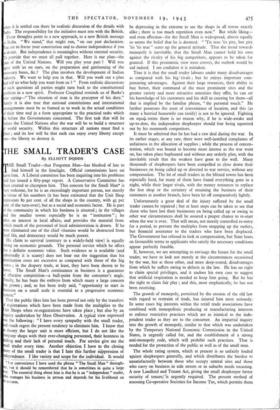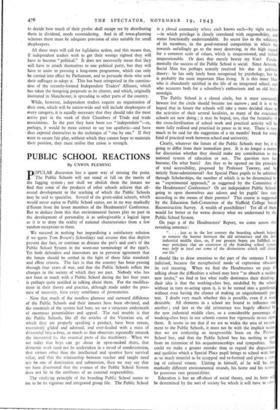HE SMALL TRADER'S CASE
By ELLIOTT BQDDS
His claim to survival (contrary, to a widely-held view) is equally trong on economic grounds. The personal service which he offers as a definite economic value. Such evidence as is available (and ittedly it is scanty) does not bear out the suggestion that his stribution costs are excessive as compared with those of the big tores ; in the drapery trade, at least, they have been shown to be ower. The Small Man's continuance in business is a guarantee f effective competition—a bull-point from the consumer's angle. inally, he has been the embryo from which many a large concern as grown ; and, as has been truly said, "opportunity to start in usiness on a small scale is essential to a progressive econOrnic , stem." • That the public likes him has been proved not only by the transfers registrations which have been made from the multiplies to the nit Shops when re-registrations have taken place ; but also by an quiry undertaken by Mass Observation. A typical view expressed as the following : "I have every sympathy with the small trader, d much regret the present tendency to eliminate him. I know that theory. the larger unit is more efficient, but I do not like the empany shops with their ever-changing personnel, their keenness in aling and their lack of personal. touch. For service give me the mall trader every. time. Another objection I have to the closing wn of the small trader is that I hate this further sUppression of dependence. I like variety and scope for the individual. It would *For convenience I have used the phrase "The Small Man" through- ut, but it should be remembeied that he is sometimes in quite a large ay. The essential thing about him is that he is an " independent " trader, ho manages his business in person and depends for his livelihood on Is success..
be depressing in the extreme to see die shops in all towns exactly alike ; there is too much repetition even now." But while liking— and even affection—for the Small Man is widespread, almost equally so seems the belief that he is doomed. " 'Tis true 'tis pity, but pity 'tis 'tis true" sums up the general attitude. That the trend towards monopolY is inevitable, that the Small Man cannot hold his own against the rivalry of his big competitors, appears to be taken for granted. If this pessimistic view were correct, the outlook would be sad indeed. I am confident it is mistaken.
True it is ,that the small trader labours under many disadvantages as compared with his big ' rivals ; but he .enjoys important com- pensating advantages. Against their large resources, their ability to buy better, their command of the most prominent sites and the greater variety and more attractive amenities they offer, he can set his knowledge of his customers and his skill in catering for them—all that is implied by the familiar phrase, "the personal touch." He further possesses the asset of convenience of location, and this (as many a hurried housewife can testify) is not to be ignored. Fighting on equal- terms there is no reason why, if he is wide-awake and up-to-date, the independent shopkeeper should fear being squeezed out by his mammoth competitors.
It must be admitted that he has had a raw deal during the war. In its earlier stages, at any rate, there were well-justified complaints of unfairness in the allocation of supplies ; while the process of concen- tration, which was bound to become more intense as the war went on, has taken place haphazard and without any orderly plan, with the inevitable result that the weakest have gone to the wall. Many thousands of shopkeepers haVe been compelled to close down their businesses on being called up or directed to war service, without any compensation. The lot of small traders in the blitzed towns has been especially hard, for many of them have found everything gone in a night, while their larger rivals, with the money resources to replace the lost shop or the certainty of retaining the business of their customers at another branch, have been let off comparatively lightly.
Unfortunately a great deal of the injury suffered by the small trader cannot. be repaired ; but at least steps can be taken to see that those who have lost their businesses on being called up or owing to other war circumstances shall be assured a proper chance to re-start . when the war is over. That will mean, not merely controlled re-entry for a period, to prevent the multiples from snapping up the outlets, but financial assistance to the traders who have been displaced.. The Government has refused to look at compensation, but State loans. on favourable terms to applicants who satisfy the necessary conditions appear perfectly feasible.
If, however, we are attempting to envisage the future for the small trader, we-have to look not merely at the circumstances occasioned by the war, but at those other, and more deep-seated, disadvantages from which he suffers owing to defects in the law. He has no right to claim special privileges, and it undoes his own case to suggest that artificial respiration is needed to keep him going. But he has the right to claim fair play ; and this, most emphatically, he has not been receiving.
The growth of monopoly, permitted by the erosion of the old law with regard to restraint of trade, has injured him most seriously:- In some cases big interests within the retail trade associations have combined with monopolistic producing or manufacturing interests, to enforce restrictive practices which are as inimical to the inde- pendent trader as they are to the consumer. An impartial inquiry into the growth of monopoly, similar to that which was undertaken by the Temporary National Economic Commission in the United States, is urgently called for, and the establishment of a strong anti-monopoly, code, which will prohibit such practices. That is needed,for the protection of the public as well as of the small man.
The whole rating system, which at present is so unfairly loaded against shopkeepers generally, and which distributes the burden so unsatisfactorily between those who occupy central sites and those who carry on business in side streets or in suburbs needs recasting. A new Landlord and Tenant Act, giving the small shopkeeper better security of tenumis urgently required. The present method of assessing Co-operative Societies for Income Tax, which permits them to decide how much of their profits shall escape tax by distributing them in dividend, needs reconsidering. And in all town-planning schemes there must be adequate provision of sites suitable for small shopkeepers.
All these steps will call for legislative action, and this means that, if independent traders wish to get their wrongs righted they will have to become "political." It does not necessarily mean that they will have to attach themselves to one political party, but they will have to unite in pressing a long-term programme, which can only be carried into effect by Parliament, and to persuade thole who seek their suffrages to adopt it. This has been retognised in the constitu- tion of the recently-formed Independent Traders' Alliance, which has taken the foregoing proposals as its charter, and which, originally instituted in Manchester, is spreading to other parts of the country.
While, however, independent traders require an organisation of their own, which will be nation-wide and will include shopkeepers of every category, it is equally necessary that they should take the most active part in the work of their Chambers of Trade and trade 'associations. In the past they have been too "independent "—or, perhaps, it would be more correct to say too apathetic—and have thus exposed themselves to the technique of "one by one." If they want to secure fair play, without which they cannot hope to maintain their position, they must realise that union is strength.



























 Previous page
Previous page